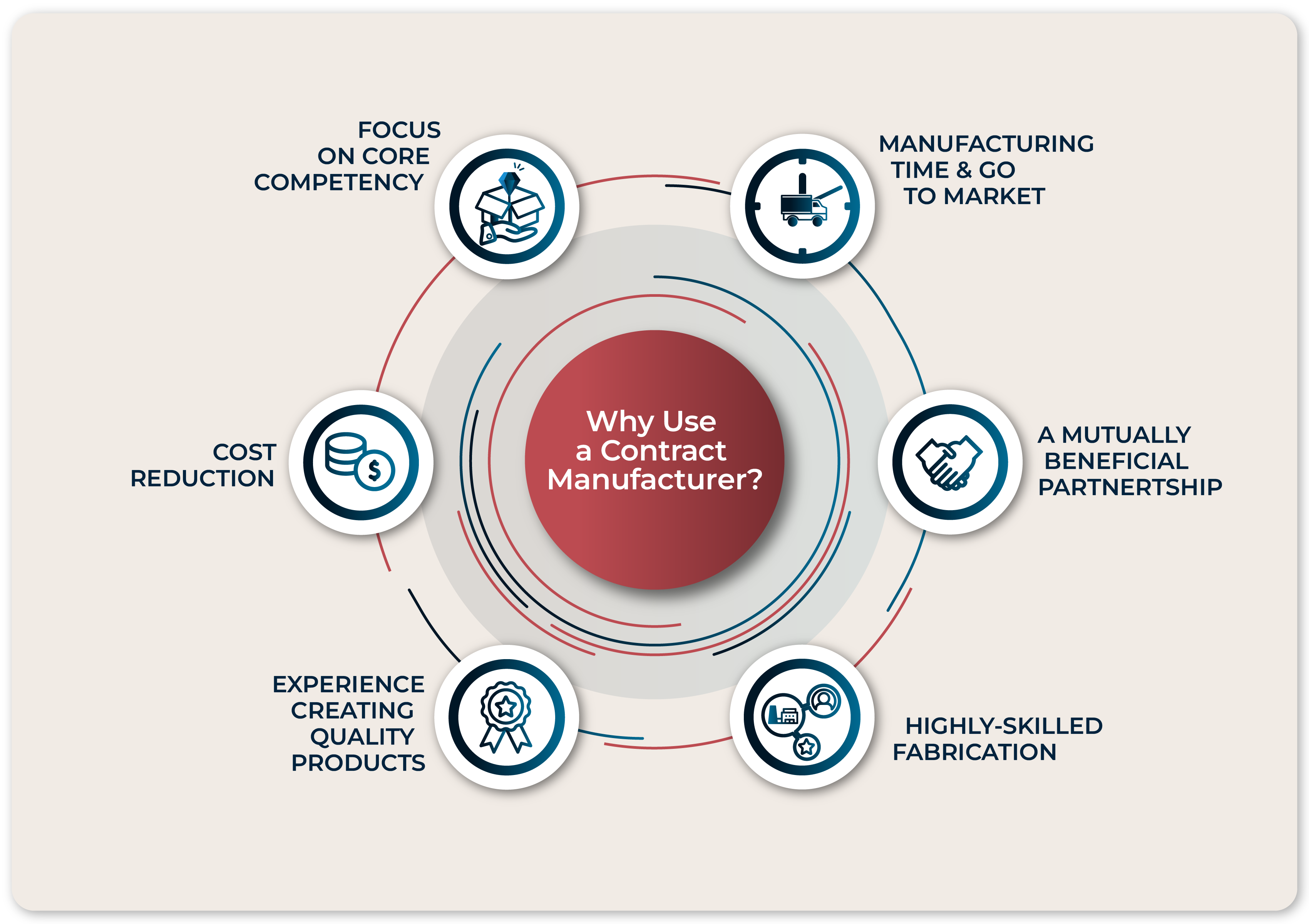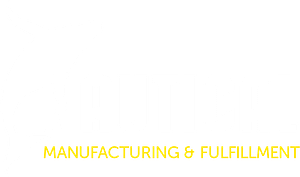Contract manufacturing is a sourcing strategy a company may choose to leverage to outsource some part of the manufacturing process to a third-party business partner. Contract manufacturers can produce components or the finished products for the business. The company may also choose to outsource the packaging of the goods to the same firm (or a specialized packager)—through a separate strategy called contract packaging. By taking advantage of available production capabilities and expertise, a company can quickly take a product to market and potentially achieve a competitive advantage over similar services.
Let’s take a deeper look at what contract manufacturing is and how it can be successfully utilized to build more business.
Why use a contract manufacturer?
Companies may lack the resources, time, or capability to produce parts or finished goods on their own. Large up-front equipment and machinery costs can create high barriers of entry for new product lines, and contract manufacturing is often an appealing alternative to significant capital investment. Here are the main benefits of outsourcing parts of manufacturing to a third-party partner.
Cost Reduction
Cost reduction can be a primary motivating factor in a company’s decision to outsource manufacturing. Avoiding large investments in equipment and maintenance costs can save companies big. This may also include labor costs, as contract manufacturers provide their own employees for the project. Additionally, the manufacturer can often achieve a lower cost-per-unit produced thanks to the economy of scale their plant has reached.
Focus On core competencies
With inefficiencies of production outsourced externally, a company is freed to focus on profit-driving operations. This better focus can also extend to new research and development opportunities, allowing the business to innovate more quickly and stay ahead of the competition. Working with a contract manufacturer allows a company to spend more time focused on adding value in ways aligned to its unique value proposition.
Manufacturing Time and go to market
By working closely with a third-party manufacturer, companies can cut down on the time it would take them to independently bring a product to consumers. The manufacturing partner can commit to production timelines that align to a go-to-market strategy, whereas an in-house job is more likely to be subject to delays and other complications. By reducing manufacturing time, a company gains an edge taking a good to market.
a mutually-beneficial partnership
A strong partnership can bring value to both a business and its contract manufacturing provider for many years to come. The reliable stream of revenue for the partner will ensure they continue to live up to quality expectations, further reinforcing the arrangement.
Highly-skilled fabricators
Partnering with a third party allows a company to take advantage of skills and technology that they may not possess in-house. The partner manufacturer is also likely to benefit from existing relationships with other industry experts that they can draw from to improve production quality or reduce cost. Access to this knowledge can help a company achieve a competitive edge.
Experience creating quality products
Contract manufacturers are likely to have developed procedures for quality control that help them detect defective or damaged materials early. Catching quality issues before they reach a customer can save a business customer services expenses and damage to its reputation.

Which industries use contract manufacturing?
Contract manufacturing spans many industries with each needing something a bit different from their manufacturer. These industries include.
Electronics: It’s no surprise that many of the tech hardware giants leverage a contract manufacturer for their components and products (smartphones, laptops, smart appliances). By working with a contract manufacturer, they can focus on their product development and software innovation.
Plastics: Companies that either sell or use plastics often use outsourced manufacturers who are experts in different plastic processing methods such as thermoforming, injection molding, and many other methods.
Automotive and Aerospace: Like the other industries, automotive companies use contract manufacturers for most of the components in the vehicle (and even sometimes for vehicle assembly). This is very similar to the process for aerospace companies as well. Contract manufacturers handle and create parts for helicopters, airplanes, and any other aircraft.
Medical: In the medical industry, contract manufacturers are often specialized. They must adhere to standards of high quality and must meet the regulatory requirements to be used in health and medicine.
Food and Beverage: Companies in the food and beverage industry rely on contract manufacturers for most of the ingredients that enable them to meet demand. Ingredients, packaging materials, and containers are just some of the things these manufacturers help with. In addition to these services, many companies also use contract packaging and repackaging services for many of their products.
Risks of contract manufacturing
With all of the stated good reasons to work with an external manufacturing supplier, it’s important to consider some of the issues that can occur.
Lack of production control
For both parties, it can be difficult to modify production once it begins. Strong communication is critical to a successful partnership. For the originating company, after they communicate the specs of a product and any other order information, little can sometimes be done to directly monitor the manufacturing process. On the manufacturer’s side, they have little recourse to make improvements or modifications to production to streamline fabrication issues without risking contract obligations.
Risk of low-quality products
If outsourcing an existing product, it’s important to conduct thorough research before choosing a contract manufacturer to avoid a dropoff in product quality. A business should select a manufacturing partner with a comprehensive QA process to help them check, measure, and test products and compare them to the business’ specific compliance requirements. For new products, be sure to adequately compare production samples to prototypes to ensure fidelity of design and execution.
Employee layoffs
Any company moving production to a third party will have to consider how layoffs will affect employee morale and company culture. For many businesses, this consideration can greatly upend any cost-saving benefit they might receive from working with a contract manufacturing provider.
Choosing the right contract manufacturer
The risks that come with working with a contracted third-party provider can be avoided by carefully vetting potential partners. When conducting due diligence on prospective partners, it’s important to consider the following factors.
What Equipment and Technologies Do They Have?
Assessing the facilities, machines, and equipment the manufacturing partner has available to them is key to choosing the right fit. A company looking for a contract manufacturer should be knowledgeable about current production techniques and technology, as these directly translate to costs and the quality of finished goods. They should also ask the manufacturer about the equipment available and make sure it can accommodate the materials that need to be used for fabrication.
Can They Grow with Your Business?
A company should select a manufacturer that can grow alongside its business and be able to scale operations to meet its needs. Demand can fluctuate, and a manufacturing partner needs to be able to match spikes in demand so revenue isn’t left on the table.
It’s also important to consider if the manufacturer is able to expand operations to match needs for new components and products, otherwise, a business may find itself looking to a growing list of additional suppliers, increasing order complexity.
Are they reputable?
This might seem obvious, but a company should seek to partner with a manufacturer that has established itself as trustworthy in the industry. Not only are these companies more likely to produce desirable output, but they also have a vested interest in protecting their reputation (so they are more likely to quickly resolve any problems that arise). Before partnering, a company should look for positive reviews on places like the Better Business Bureau and Google, and review examples of past projects the manufacturer has done (asking for examples that are similar to the project, if possible).
Finally, it pays to do a bit more research and look on the provider’s website for information about the team. A company should inquire about relevant staff experience and completed projects to help ensure a good fit and reduce risk.
Review their Certifications
Conduct a Feasibility Study
When evaluating contract manufacturers, a company should assess how a partner will fit within their business model. Conducting a feasibility study for outsourcing fabrication will include collecting data about the project, mapping out comparative costs of producing the product in-house (including overhead costs, labor, equipment purchases and maintenance, depreciation, quality assurance, and other aspects of production), reviewing differences in production time and the impact this difference will have in meeting demand, etc.
Consider all costs
Some costs associated with outsourced manufacturing are not as obvious. Such as shipping costs, tariffs, compliance requirements, and packaging. A company needs to be aware of all potential costs of outsourced vs in-house production.
Are they a strong communicator?
Working with a partner requires frequent discussions between the two parties, so communication is vital to success. Early discussions with a prospective third-party supplier can help signal how effectively they communicate. Do they proactively communicate and make an effort to keep all parties informed on progress and potential challenges? Working with a partner that provides great communication is essential to ensure that the manufacturing process of your products is going smoothly. This becomes even more important when the manufacturer is overseas, making visiting and checking operations more difficult.
where are they located?
Where a contract manufacturer is located can be important to their viability as a production partner. Farther distance means higher shipping costs.—. A nearby facility may also make it easier for meetings (both in-person and remote meetings due to fewer time zone shifts).
When To Consider A Contract Manufacturing Partner
Contract manufacturing isn’t the best manufacturing option in every scenario. Some companies are much better off keeping production in-house than utilizing manufacturing partners. Typically, these situations may warrant considering a third-party partner:
You Need Products Quickly: By working with an experienced manufacturer, you cut out a large part of the trial and error process when attempting to manufacture a product. Allowing you to decrease time-to-market.
You Have Fluctuating Demand: If your company experiences things like seasonal demand, it could be beneficial to work with a contract manufacturer for those high-demand times.
You Need to Conserve Capital: By working with a contract manufacturer, the costs allocated towards manufacturing products are significantly lower than if you ran operations in-house. Allowing for less capital outlay.
Take Care Of Your Contract Manufacturing Needs With Nautical
For any manufacturing needs, our direct relationships with sourcing specialists internationally allow us to provide high-quality products in the most cost-effective way for our customers. The value doesn’t just end there though, we are committed to quality. That is why we have on-site quality inspections of all products to ensure they are up to standards every time.
In addition to all our manufacturing services, we also offer 3PL, freight, contract packaging and repacking, and many other value-added services to clients allowing us to be a full-service supply chain partner for any company’s needs.




